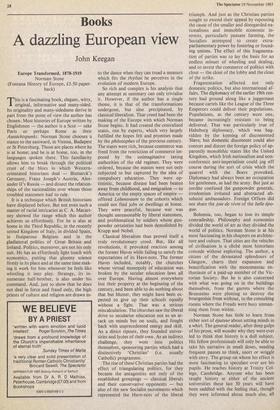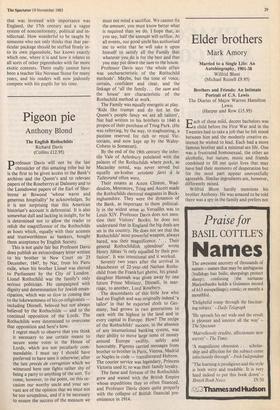Books
A dazzling European view
John Keegan Europe Transformed, 1878-1919 Norman Stone (Fontana History of Europe, £3.50 paper- back) This is a fascinating book, elegant, witty, original, informative and many-sided. Its originality and many-sidedness derive in part from the point of view the author has chosen. Most histories of Europe written by Englishmen — the author is a Scot — take Paris or perhaps Rome as their Aussichtspunkt. Norman Stone chooses a stance to the eastward, in Vienna, Budapest or St Petersburg. Those are places where he is at home; and he is at home, too, in the languages spoken there. This familiarity allows him to break through the political crust of the blocs in which Western- orientated historians deal — Bismarck's Germany, Franz Joseph's Austria, Alex- ander II's Russia — and dissect the relation- ships of the nationalities over whom those troubled statesmen had to rule.
It is a technique which British historians have displayed before. But not even such a master of racial intricacies as C. A. Macart- ney showed the range which this author achieves so effortlessly. For he is also at home in the Third Republic, in the recently united Kingdom of Italy, in divided Spain, in fissiparous Belgium and in the gladiatoral politics of Great Britain and Ireland. Politics, moreover, are not his only suit. He has an effortlessly light touch with economics, putting that gloomy science firmly in its place and at the same time mak- ing it work for him whenever he feels like whistling it into play. Strategy, its in- numerate half-brother, is also under his command. And, just to show that he does not deal in force and fraud only, the high priests of culture and religion are drawn in- to the dance when they can tread a measure which fits the rhythm he perceives in the evolution of modern Europe.
So rich and complex is his analysis that any attempt at summary can only trivialise it. However, if the author has a single theme, it is that of the transformations undergone, but also precipitated, by classical liberalism. That creed had been the making of the Europe with which Norman Stone begins. It had created the centralised states, run by experts, which very largely fulfilled the hopes felt and promises made by the philosophes of the previous century. The states were rich, because commerce was freed from the restriction of commerce im- posed by the unimaginative taxing authorities of the old regimes. They were ordered, because the masses were not only subjected to but captured by the idea of compulsory education. They were op- timistic, because disease had been beaten away from childhood, and emigration — to America or the empty spaces of empire offered Lebensraum to the cohorts which could not find jobs or dwellings at home. They were peaceful, because war was thought unreasonable by liberal statesmen, and problematical by soldiers whose gun- powder certainties had been demolished by Krupp and Nobel.
Classical liberalism thus proved itself a truly revolutionary creed. But, like all revolutions, it provoked reaction among the former Haves while failing to satisfy the expectations of its Have-nots. The former Haves included, notably, the churches whose virtual monopoly of education was broken by the secular education laws all over Europe. Having almost everywhere lost their property at the beginning of the century, and been able to do nothing about that but bluster, they might have been ex- pected to give up their schools equally without a fight. That was a serious miscalculation. The churches saw the liberal drive to secularise education not as an at- tack on minds but on souls, and fought back with unprecedented energy and skill. As a direct riposte, they founded univer- sities and lycees of their own. As an indirect challenge, they went into politics themselves, sponsoring parties which had a distinctively 'Christian' (i.e. usually Catholic) programme.
The rise of these Christian parties had the effect of triangulating politics, for they became the antagonists not only of the established groupings — classical liberals and their conservative opponents — but also of the new Socialist movements which represented the Have-nots of the liberal triumph. And just as the Christian parties sought to extend their appeal by espousing the cause of the smaller and disregarded na- tionalisms and immobile economic in- terests, particularly peasant farming, the Socialists attempted to create extra- parliamentary power by fostering or found- ing unions. The effect of this fragmenta- tion of parties was to lay the basis for an endless minuet of wheeling and dealing, and to invest the commerce of politics with clout — the clout of the lobby and the clout of the strike.
Fragmentation affected not only domestic politics, but also international af- fairs. The diplomacy of the earlier 19th cen- tury had ground along like a juggernaut because cartels like the League of the Three Emperors could deliver their populations. Populations, as the century wore one, became increasingly resistant to being delivered. That was particularly true of Habsburg diplomacy, which was hag- ridden by the keening of discontented Slays; but domestic discontent could also contort and distort the foreign policy of ap- parently monolithic states like the United Kingdom, which Irish nationalism and non- conformist anti-imperialism could jog off course during the sort of crisis which the quarrel with the Boers provoked. Diplomacy had always been an occupation for gentlemen, as had the army. But just as cordite confused the gunpowder generals, irredentism irritated and abstracted ab- solutist ambassadors. Foreign Offices did not share the joie de vivre of the belle épo- que.
Bohemia, too, began to lose its simple comradeship. Philosophy and economics divided the world of art as they divided the world of politics. Norman Stone is at his most fascinating in his chapters on architec- ture and culture. That cities are the vehicles of civilisation is a cliché most historians concede without exploring. The author, a citizen of the devastated splendours of Glasgow, charts their expansion and beautification with the monomaniac en- thusiasm of a paid-up member of the Vic- torian Society. But he is also concerned with what was going on in the buildings themselves, from the garrets where the Bronsteins were plotting to destroy the bourgeoisie from without, to the consulting rooms where the Freuds were busy unman- ning them from within.
Norman Stone has little to learn from either sort of epateur about setting minds in a whirl. The general reader, after deep gulps of his prose, will wonder why they were ever led to think that history is a dull subject. His fellow professionals will only be able to take his narrative in small doses, needing frequent pauses to think, snort or wriggle with envy. The group on whom his effect is most fascinating to speculate over are his pupils. He teaches history at Trinity Col- lege, Cambridge. Anyone who has been taught history at either of the ancient universities these last 30 years will have been saddled with the feeling that, though they were informed about much else, all
that was invested with importance was England, the 17th century and a vague system of nonconformity, political and in- tellectual. How wonderful to be taught by someone who not only thinks that that par- ticular package should be stuffed firmly in- to its own pigeonhole, but knows exactly which one, where it is and how it relates to all sorts of other pigeonholes with far more exotic contents. There really cannot have been a teacher like Norman Stone for many years, and his readers will now jealously compete with his pupils for his time.



























































 Previous page
Previous page